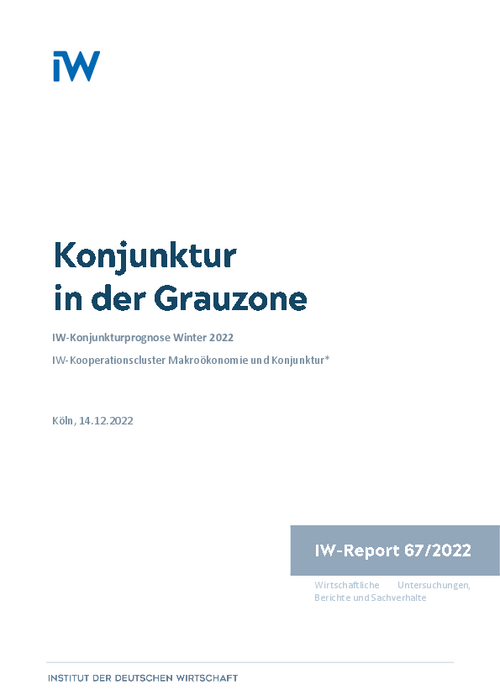The geopolitical situation, the global energy and commodity bottlenecks and the resulting high inflation have considerably dimmed the economic outlook across the world. A slowdown in China and in the advanced economies is hampering global growth, with the world economy set to expand by only 2 per cent in 2023.

The IW Economic Forecast Winter 2022: The Business Cycle in the Grey Zone

The geopolitical situation, the global energy and commodity bottlenecks and the resulting high inflation have considerably dimmed the economic outlook across the world. A slowdown in China and in the advanced economies is hampering global growth, with the world economy set to expand by only 2 per cent in 2023.
In Germany, on the other hand, key stress factors have recently appeared less severe. The danger of a gas shortage in the winter of 2022/2023 has receded, but the risk of disruption to production remains and is likely to be even more pronounced in the winter of 2023/2024. Energy prices have dipped back below their record levels of summer 2022, but remain high, a trend that applies equally to materials bottlenecks in manufacturing and construction. On the positive side, the wage agreements reached so far this year will serve to defuse the danger of a price-wage-price spiral. Moreover, the government is doling out massive amounts to mitigate the effects of the energy price crisis, especially for private households. None the less, company and consumer surveys point to a noticeable recession in the last quarter of this year and the first of 2023. For 2023 as a whole, the German economy is likely to be spared an economic slump comparable to the crashes of the 2008/2009 financial crisis and the Covid19 pandemic. Still, the cost shocks and an inflation rate of just under 7 per cent are clearly putting pressure on private consumption. Investment is declining overall, with the steep drop in construction investment countered by only a slight increase in investment in machinery and equipment. Foreign trade remains positive, but is suffering from a cooling global economy. Thus only if the recovery expected for the second half of 2023 materialises will the year-on-year drop in average real gross domestic product for 2023 stay below ¾ per cent. How severely the economy is likely to be hampered next winter depends on how successfully gas and energy supplies can be built up and secured in advance and thus will only become clear in the course of 2023. The effects of the energy crisis are making themselves felt in the German labour market and employment growth will slow perceptibly in 2023, though the rise in unemployment will be minimal. Despite the high government transfers, in 2023 public debt will stay just under 70 per cent of GDP.

The IW Economic Forecast Winter 2022: The Business Cycle in the Grey Zone

More on the topic

Determinants of personnel planning in Germany
The German labor market has been growing since 2005. The dip in the wake of the coronavirus pandemic between 2020 and 2022 is an exception, as the German labor market has reached a record level of 45.9 million people in employment by 2023.
IW
Effects of the Middle East conflict on the German economy
Beyond the humanitarian crisis associated with the geopolitical conflict in Israel, which affects millions of human lives, the Middle East conflict also leaves lasting marks on economic activity not only in the affected region, but also in Germany and the ...
IW